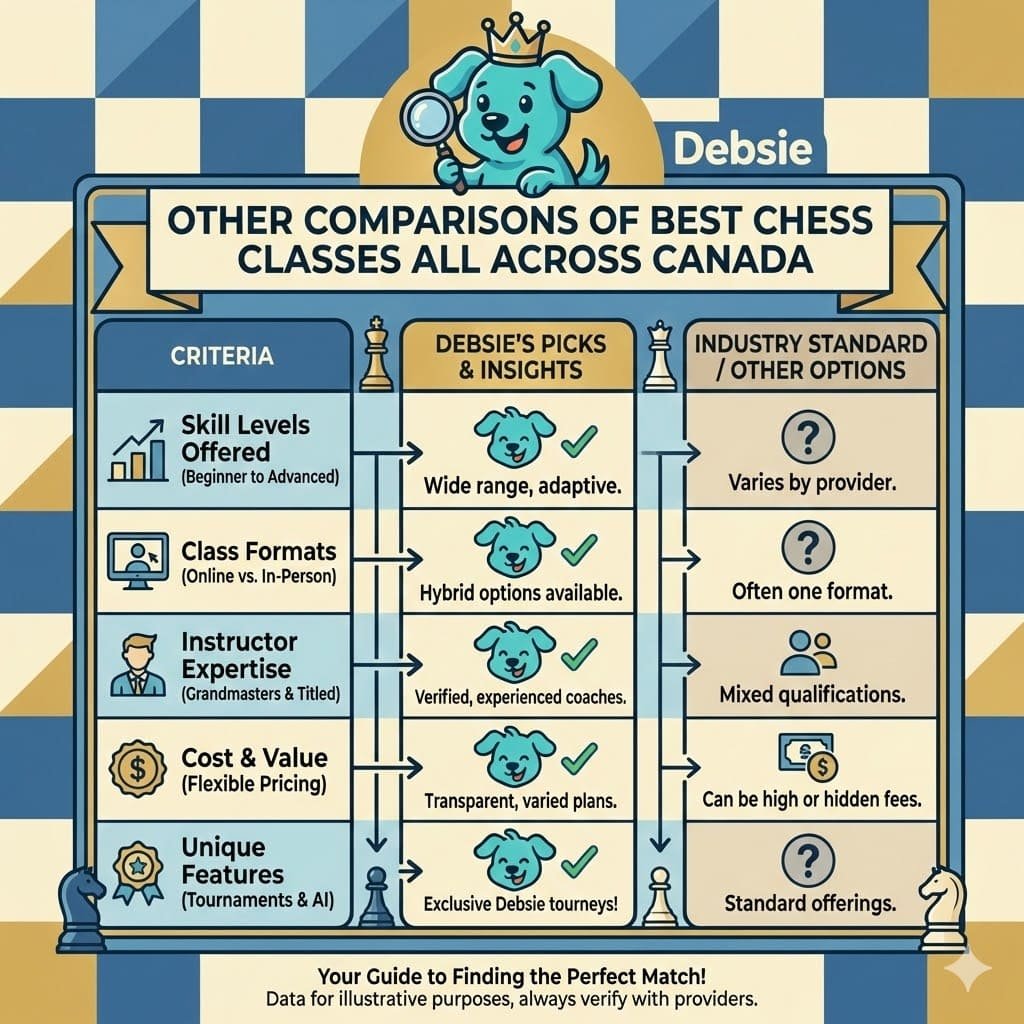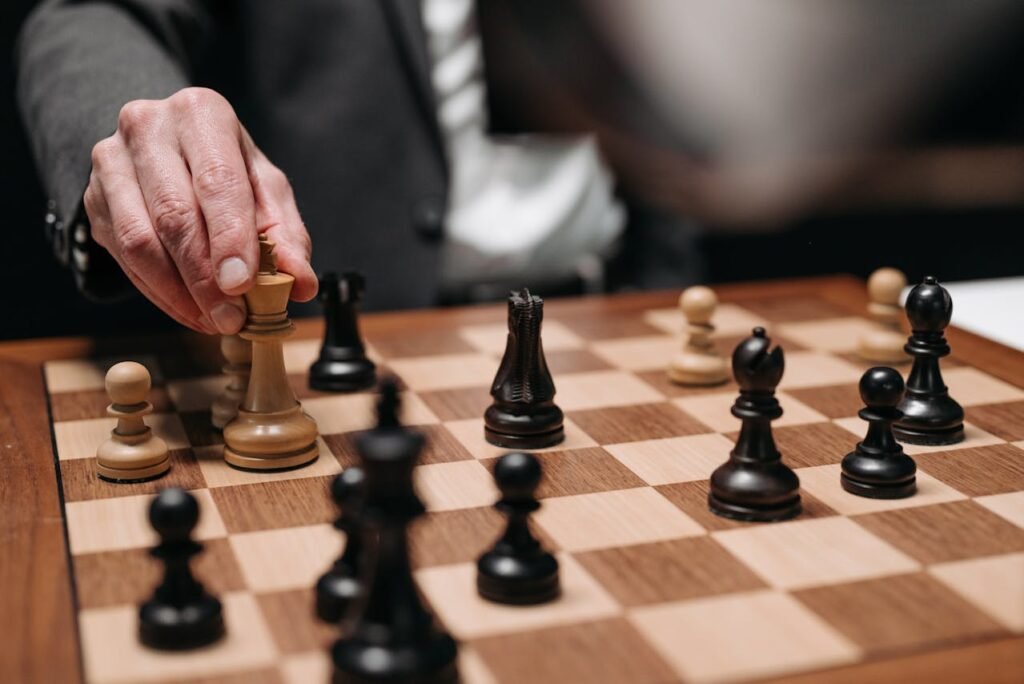If your child or you are learning chess in Calgary, you may be wondering: Which chess class or tutor is best? Should we learn online or go to a local academy? Can an online class really be as good—or better—than an in‑person one?
In this article, we’ll explore all of that. We’ll share what makes a great chess tutor. We’ll look at why many families are choosing online chess training these days. And we’ll show you the top chess academies and coaches in Calgary. But there’s one name you’ll see first, because it leads in doing things the right way: Debsie.
Debsie is not just another chess class. It’s a chess academy built to help students not only get better at chess but also build focus, patience, thinking smart, and confidence. Because chess is more than opening moves or tactics—it teaches life skills too. And when a student learns well, they carry those lessons far beyond the chessboard.
We will also compare offline (in‑person) chess training with online training: what’s good, what’s hard, where it works best. Then we’ll look at a few of the well‑known chess academies in Calgary. You’ll see how each does things. You’ll also see what makes Debsie stand out: its training method, its coaches, its structure, its curriculum.
Online Chess Training
Landscape of Chess Training in Calgary and Why Online Chess Training is the Right Choice
In Calgary, there are many ways to learn chess. Some schools hold classes in person. Some coaches visit students. Others teach both in person and online. But life is busy. Many parents drive kids back and forth.
Many students have school, homework, other activities. Sometimes, the weather is bad, or traffic is hard. All these make going out harder.
Online chess training solves many of those problems. When a student and coach connect through the internet, the student can be at home, in a quiet room or anywhere that works. There is no travel time.
That saves time and energy. It also means students can pick times that suit them: after school, on weekends, or evenings.
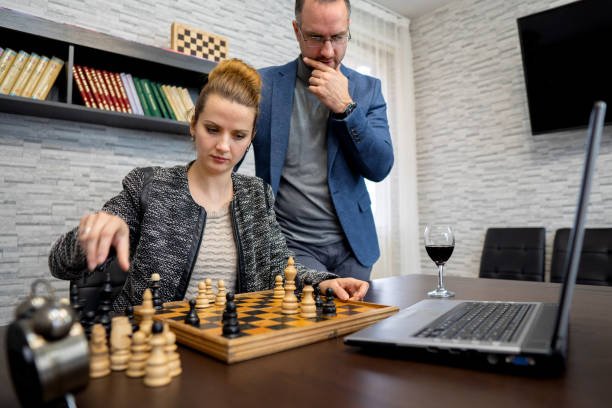
Another thing: online tools are strong. When learning online, you can see the board shared on screen. Moves can be paused, replayed, arrows and colors can be used to show ideas, tactics, patterns. You can review game history, get puzzles to solve, do homework assignments, watch videos made by coaches. All these help learning faster.
Because Calgary has both busy lives and many good coaches, online training becomes the right choice often. If a coach is great but far away, online lets you learn from them without moving. If you want more flexibility, online gives that.
If your goal is steady progress, having structured online lessons helps you stay on track even if local options are crowded or limited.
How Debsie is The Best Choice When It Comes to Chess Training in Calgary
Debsie is built especially to work well online. We believe online training can be better than just in‑person, if done right. Debsie uses a clear curriculum. That means we have steps for beginners, then intermediate, then advanced, with lessons that build on what came before.
There are puzzles, tactics, openings, endgames, middle‑game strategy. Every student at Debsie knows what to expect next and what to work on.
The coaches at Debsie are FIDE‑certified or very experienced. They know not just how to play chess, but how to teach chess. They adjust to each student’s strength and pace. If a student is slow with tactics, coach gives more work there. If student is good at calculating but weak in endgames, coach focuses on endgames.
Debsie gives strong feedback. After a lesson, you get notes: what you did well, what to improve, homework to practice. And you can review lessons (if recorded) to see what you missed.
Also, Debsie has many students, so they see patterns: common errors, common weak points. Because of that, the curriculum is refined: updated often to catch those common mistakes early.
Also, communication is easy. At Debsie, you can talk with coach between lessons, ask questions, send in games for analysis. That helps a lot. You are not just attending class, you are building a relationship with coach.
Debsie also brings life skills from chess into learning: focus, patience, decision‑making, thinking ahead. It is not just about winning games. It is about growing as a thinker.
Because of all these, many students in Calgary who choose online prefer Debsie. They find they improve steadily, feel supported, and enjoy the process. Debsie works to make sure online lessons are never feel distant or impersonal. They feel real, warm, helpful.
Offline Chess Training
Offline chess training usually means going to a chess club, community center, library, or someone’s house for lessons. It can also mean a coach coming to your home. Many years ago, this was the only way to learn chess. Some people still prefer this method because they enjoy seeing the coach in person or meeting other players face to face.
In Calgary, there are a few places where this kind of training happens. These clubs or centers often run once or twice a week. You sit with a group, and a coach explains the topic on a board or sometimes on a projector.
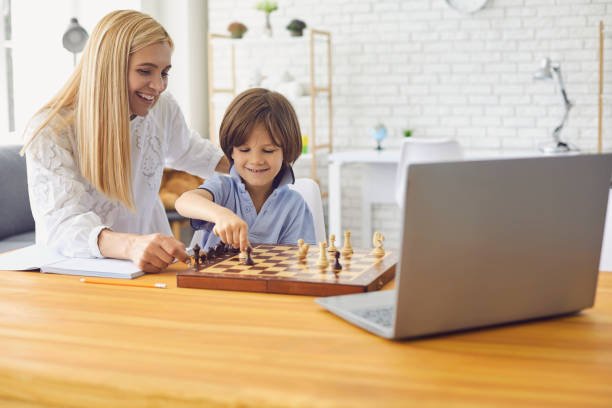
You may play practice games afterward. If it’s a one-on-one session, the coach sits across the board from you and discusses your moves, your mistakes, and your ideas.
Some kids enjoy this. They like the social part. Others may find it slow, or the teaching too general, especially in a group. Everyone has different needs, and sometimes offline lessons can’t adjust for that quickly.
Also, not all offline coaches follow a clear path. Some teach from what they know or feel like that day. That’s fine if the student is casual. But if the student wants to grow fast or play in tournaments, this might not work.
Another part to think about is time and effort. Going to and from class takes time. Bad weather in Calgary, especially during winter, can make travel harder. If the coach has to travel to your home, that can limit how many lessons are available each week.
If they are late or stuck, your lesson is delayed. Offline training also sometimes lacks tech tools that make things smoother—like game databases, interactive boards, or automatic tracking of progress.
That doesn’t mean all offline training is bad. It can still be good when structured well, especially with strong coaches. But it needs to be more flexible and better planned to match what online can offer now.
Drawbacks of Offline Chess Training
Offline chess training may sound simple and traditional, but it comes with many hidden problems—especially when compared to what modern online learning can offer. These challenges affect how fast a child learns, how deep they understand, and how much they enjoy the process.
One of the biggest issues is that offline training often does not follow a proper curriculum. Many local coaches, even experienced ones, teach from memory. They explain what they feel is right at the moment. One week it might be openings, the next week it’s puzzles, then maybe a game analysis. But there’s no step‑by‑step path.
This makes it hard for students to know where they are going or how close they are to their goals. They may spend a year in class but still feel confused during tournaments.
Another challenge is personalization. In a group class, there may be 8 to 12 students—or more. Everyone learns at a different pace. Some kids pick up tactics fast. Others struggle. But because the coach must teach everyone together, students either get bored or feel left behind. That makes learning stressful.
One-on-one sessions help a bit, but many offline tutors still use a one-size-fits-all method. They don’t have the tools or structure to adapt each lesson for each child.
Time is another problem. Calgary is a big city. Driving to a center or waiting for a coach to come over can take a lot of time, especially after school or during weekends. That’s tiring for both parents and children. Add traffic, snow, or scheduling delays, and soon the fun of chess starts to feel like a burden.
Offline training also lacks smart tools. Online training uses tools like chess engines, training boards, homework assignments, analysis software, and live game feedback. Offline classes rarely use these well.
Students may write moves by hand or try to remember what the coach said. That limits their improvement. Also, offline coaches may not record games or lessons, so it’s easy to forget what you learned.
Cost is another hidden drawback. Because offline coaches spend time traveling or run classes in rented spaces, fees can be higher. But the value may not match the price—especially if there’s no clear structure, no extra support between lessons, and no tools to help students improve at home.
Finally, consistency is a big issue. If a student misses a class, it’s often gone forever. There’s no recording, no homework follow‑up. In online training, students can watch the class again or catch up with extra resources. In offline, you just miss out.
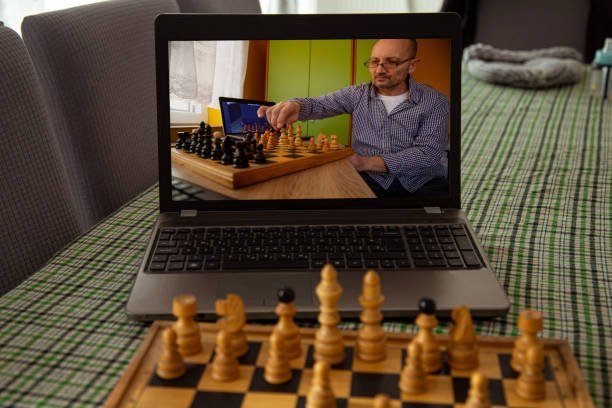
Best Chess Academies in Calgary
In this section I describe some of the strong chess academies, clubs, and tutors in Calgary. You’ll see how Debsie looks versus others, what you get, how they teach, prices, strengths and weaknesses. This will help you pick well.
1. Debsie
Debsie is designed to give the best possible chess learning experience online. If you choose Debsie, here is what you get, and why many students and parents in Calgary and beyond prefer it.
Debsie’s program starts with a free trial class. This lets you see if you like the style, the coach, and how lessons are done. From there, Debsie assigns you a coach who is FIDE‑certified or very experienced.
Your coach studies your current level (do you know basic rules? do you know common tactics? what mistakes you make?). Based on that, they pick a plan just for you.
Lessons happen live, online, one‑on‑one. You share a board on screen. The coach shows ideas, lets you move pieces, you try tactics, they correct your thinking mid‑move.
After each lesson, you get homework: puzzles, game analysis, maybe opening preparation. The homework is matched to where you are. You do not waste time doing too easy or irrelevant work.
Debsie has a structured curriculum. It begins with basics: rules, piece movement, check, checkmate. Then you move to tactics (forks, pins, skewers), then strategy (how to think ahead, plan, evaluate positions), opening theory basics, middle game ideas, endgames. As you advance, lessons include analysis of your own games, training to think like a tournament player: time management, psychological readiness, avoiding blunders.
Between lessons you get feedback. The coach reviews your games you played outside the lesson (online or offline), points out patterns of errors, and gives exercises tied to those errors. If you miss a lesson or need to revisit something, Debsie often has recordings or notes so you can catch up.
Debsie also cares about life skills. Focus, patience, planning ahead, learning from mistakes — these are built in. They don’t just chase winning; they chase growth. Because of this, students often feel more confident not only in chess but in school, in thinking, in decision making.
2. Chess Minds Calgary
Chess Minds Calgary is one of the popular in‑person academies in Calgary. It offers classes, camps (during school breaks), tournaments, group lessons. Teachers include strong local masters, and they aim to make lessons fun while teaching strategy and fundamentals.
Their strengths are that you meet peers face to face, you can see coaches in person, which many kids like. The social side is strong. Coaches often can spot physical tells or body language during a live game which helps in certain training. They also run regular seasonal classes, so there is a rhythm (fall, winter, spring) which helps schedule. They also teach at a variety of ages and levels.
Where Chess Minds might be weaker compared to Debsie is flexibility and individualization. Because group classes are cheaper, you may sometimes be grouped with others of mixed strength.
3. Bearspaw Junior Chess Club
Bearspaw Junior Chess Club teaches students aged about 5 through 18, of different levels. They meet in person, at a set location (Bearspaw area). They run classes, tournaments for juniors, likely offerings for school breaks.
This club is good for younger students who want local face‑to‑face learning, meeting nearby kids, less screen time, and for parents who prefer in‑person oversight. The location in Bearspaw might be more convenient for some families on that side of Calgary. However, for students in other areas, commute could be long.
Also, because they are a club, the structure may not be as full or as tailored as a full academy. They may not always offer online follow up, homework analysis, game reviews outside the class.
4. Calgary Chess Club
The Calgary Chess Club is historic and well‑known. It offers regular weekly meetings, lessons, tournament events. It is a place where serious players and casual players mix. If you want to play live games, meet many players, get experience in competition, this club gives opportunities.
Strengths include exposure: playing different people, witnessing more games, experiencing over‑the‑board settings under real time pressure. Also, the sense of community is strong. But drawbacks are that coaching may not always be highly personalized; lessons may be more general group sessions or drop‑in; scheduling depends on club events rather than structured curriculum.
5. Tutoring via Superprof / Private Tutors
There are many private tutors in Calgary who teach chess one‑on‑one, both in person and online. For example, through Superprof, you can find tutors charging around CA$30‑$50 per hour, with experiences in openings, tactics, endgames. Some are very patient, some more competitive.
The good side is you can pick a tutor based on your price, your availability, your style. If you find a tutor who matches well, you get personal attention. But often, private tutors without being part of an academy may not offer a full curriculum or assessment of long‑term tracking. They may teach what they know, but not always what you need next. Also, logistics (finding, confirming, scheduling) falls on you.
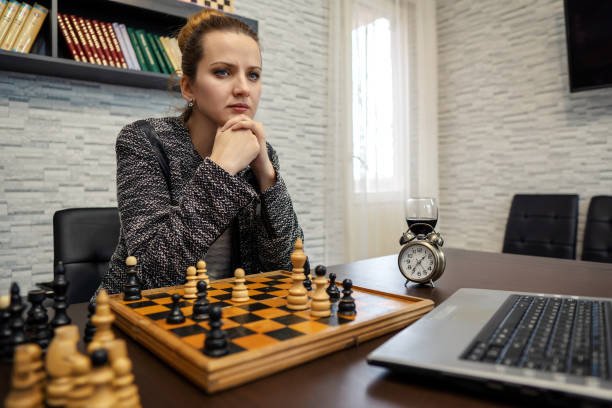
Why Online Chess Training is The Future
Online chess training is growing fast. Many things make it the future choice for most learners. First, technology makes the lessons rich: shared digital boards, puzzles with instant feedback, video recordings, analysis tools, engines, databases are all accessible in online mode. Students can replay lessons, pause, rewind, go at their own pace.
Second, online removes geographical limits. A student in a neighborhood where there are few strong coaches can still learn from a coach in any city or country. Quality is not bound by location.
Third, flexibility matters: scheduling, time saved from travel, choosing times that suit the student. This makes attendance more reliable, and regular practice more likely.
Fourth, cost is often lower or gives more value. Because the coach does not spend time traveling or you don’t pay for meeting space, more of the fee goes into content, resources, feedback.
Fifth, especially after COVID and with better internet, students and parents have grown used to online interaction; comfort with online is higher. Many online platforms now are very good at simulating in‑person features.
How Debsie leads the Online Chess Training Landscape
Debsie leads this space because it combines all the good parts of online (technology, flexibility, reach) with strong pedagogy (clear curriculum, feedback, support, life‑skill development). Debsie does not treat chess as just moves on a board. It treats learning as growth: thinking clearly, being patient, making decisions.
Debsie makes sure students are not lost between lessons. Parents get updates. Students get follow‑ups. Mistakes are treated as stepping stones. Exercises are chosen to build weaknesses. Games are analysed. Homework is tracked. Progress is measured.
Debsie also invests in keeping lessons engaging. Games, puzzles, challenges, friendly competitions, peer learning etc. This keeps student interest up, which is often what stops people from improving: boredom or lack of motivation.
Finally, Debsie’s online methods are cutting‑edge: digital boards, recordings, ready resources, and an ability to reach good coaches without putting strain on travel or location. All these add up to faster improvement, better confidence, more joy.
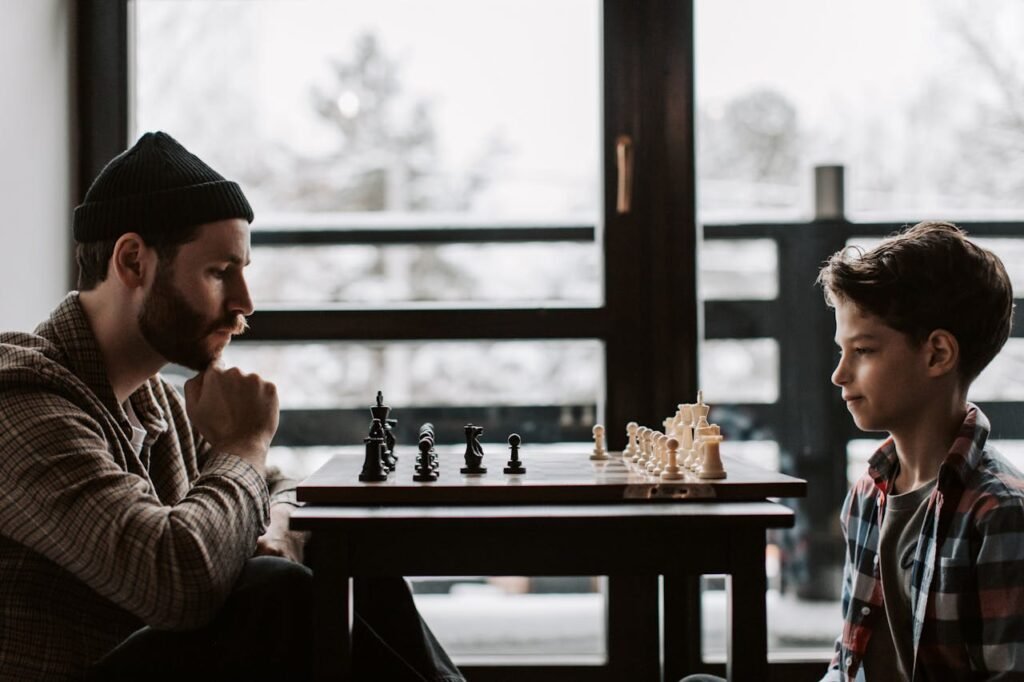
Conclusion
Finding the right chess class for your child in Calgary isn’t just about learning how to move pieces on a board. It’s about finding a place where your child can think better, focus deeper, grow stronger. That place should be safe, structured, fun—and full of real learning. That place is Debsie.
At Debsie, we don’t just teach chess. We guide students step by step. We give them skills that last for life. Patience. Focus. Smart thinking. Calm under pressure. We give feedback that makes sense. We follow a real path. And we make sure no student is ever left behind.
Many families in Calgary still try offline classes or local tutors. But more and more are turning to Debsie’s online classes—because they see real results, fast improvement, and happy, confident kids. No long drives. No missed classes. No guessing what comes next. Just simple, smart, focused lessons that work.
So if you want your child to enjoy chess—and grow into a strong, smart, clear thinker—Debsie is the right choice. You can even start with a free trial. No stress. Just try one class and see how it feels.
👉 Take your free trial class here
Comparisons With Other Chess Schools:
Other Comparisons of Best Chess Classes All Across Canada:
